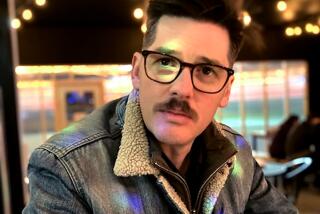Book review: ‘Loose Diamonds … and Other Things I’ve Lost (and Found) Along the Way’ by Amy Ephron
Shelve this one under a category that should be named ‘’bouquet memoirs.’’
Books like Amy Ephron’s “Loose Diamonds … and Other Things I’ve Lost (and Found) Along the Way” are a nosegay of life essays whose pronouns are mostly “I” and “we,” but are also by implication “you” — as in, “here’s my experience of this or that life-changing moment; what’s yours?”
So the essays in such collections fall into two sorts. The first are the accounts of seminal events that the author shares with many of the rest of us — friends, work, marriage, divorce, remarriage, families blended and un-blended, dealing with parents and dealing with being a parent. Who doesn’t have some version of this echt Ephron first-love comedown: “What I took for a laconic, laid-back nature was really a heroin addiction”?
The second kind of essay has to do with the one-off moments that the reader will probably never get to experience. This is where I would lump the stories that I tell to my friends, like the one that begins, “The second time I met Cary Grant…” They love hearing them, but unless they met Cary Grant, there’s no equivalent of their own.
Ephron shuttles back and forth between these two, usually adroitly, and sometimes in the same essay. There she is, in marathon labor — OK, most women have been there, done that — but she’s in a hospital in L.A., and who strolls in to visit the screaming young woman in the bed opposite Ephron but Elizabeth Taylor, mother-in-law of the screamer. La Taylor is carrying a tiny white dog, and her assistant is carrying a primitive cellphone “almost as large as the dog.”
As an accomplished writer in a family of accomplished writers, Ephron’s life is already pitched at a more exalted level than most people’s. Her son drops an anchor on his toe early one summer — kid mishap, OK — and spends “the rest of the vacation lying on the couch” in a house on Martha’s Vineyard, rented from Alexandra Styron, daughter of novelist William Styron (and a writer as well). In the amusing chapter, “Why I Quit Being Psychic,” I was momentarily stopped short on the sentence that casually begins, “My first husband, Sasha, and I were playing bridge with T-Bone Burnett…”
I’m not sure whether Ephron wants us to linger vicariously on these moments, with our noses pressed to these glamorous windows, or wants to hurry through them to get to the “just-us” parts of her tales.
The most journalistic essay in “Loose Diamonds” is Ephron’s 1971 encounter with Manson family member — and later attempted presidential assassin — Lynette Alice “Squeaky” Fromme; wherever else Fromme’s needle flicked over from odd to ominous, there is a female universe of poignancy in Fromme, sitting on a fence at the notorious Spahn Ranch, telling Ephron, “Charlie was the first person who ever told me I was pretty. And so, I went with him.”
It’s a book like my grandmother’s beloved Whitman’s Sampler — or maybe, in Ephron’s family, a Godiva assortment: one or two, you take a tentative bite to see what’s inside and spit it out (coconut — gross), and one or two are unforgettable, like the essay “Security Check.” Ephron’s boarding a plane two years before Sept. 11 when another passenger, a bearded Middle Eastern man, strokes the fuselage and smiles and says, “Going to explode.” It was an unsettling story to tell before Sept. 11 — what, it asks, would you have done? — but to read it now is downright harrowing.
The “loose diamonds” of the title is also an introduction to her essay spun around the theft of Ephron’s jewelry. The phrase also serves as a metaphor for the aimless, deracinated men and women who populate Ephron’s native Los Angeles.
And because I agree with her in that, I will give her a Southern California dispensation for the final essay, “I Love Saks,” about her first pilgrimage to the New York mercantile sanctum. The dispensation comes only because Bullocks Wilshire, the proper shopping temple for an Angeleno, could not, to my sorrow, meet Ephron’s Saks’ standard: “It’s still there.”
More to Read
The biggest entertainment stories
Get our big stories about Hollywood, film, television, music, arts, culture and more right in your inbox as soon as they publish.
You may occasionally receive promotional content from the Los Angeles Times.







